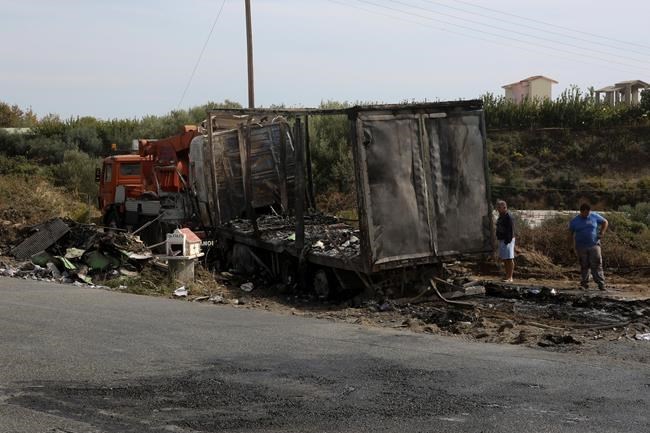
In this Saturday, Oct. 13, 2018 photo, a burnt-out truck is seen next to a highway at Sarakina, northern Greece, after a car transporting migrants and refugees crashed into a truck killing three people. As gangs smuggling migrants into Greece from Turkey increasingly favor the land route over the risky sea crossing, police have adopted a new tactic, stopping drivers who work for the gangs and charging them with traffic violations before they can pick up their human cargo. (Ilias Kotsireas/InTime News via AP)
March 27, 2019 - 1:12 AM
THESSALONIKI, Greece - Police in northern Greece have adopted a new tactic for disrupting gangs that smuggle people into the country from across the land border with Turkey, an increasingly popular route: stopping drivers who work for the gangs and charging them with traffic violations before they can pick up their human cargo.
The drivers can't be charged with smuggling if they don't have migrants with them. But they can face prison terms of several months and stiff fines for violations such as driving without a license, and their cars can be impounded.
The strategy is much less dangerous than policing the border by having patrol cars chase old vehicles crammed with people who just entered Greece. Smugglers sometimes use teenagers with minimal driving experience to transport migrants from the border to other destinations, risking horrific losses of life if they panic and crash during a police pursuit.
In October, a car smuggling migrants collided with a truck and burst into flames near the city of Kavala in northeastern Greece, killing all 11 people who somehow were squeezed inside.
Accidents in northeastern Greece involving vehicles driven by smugglers killed 30 migrants last year — including the 11 killed near Kavala — and injured another 95, according to police data.
"In the serious accidents with refugee and migrant victims, most of the drivers who survived and were immigrants from Asian countries, didn't have driving licenses," said Major-General Nikolaos Menexidis, the police chief for Greece's border region of Thrace and adjoining Eastern Macedonia. "The vehicles were in bad condition, many had worn tires, because the gangs are looking for cheap ways to do their business."
Typically, smuggling gangs charge 1,500-2,000 euros ($1,700-$2,260) per person to sneak migrants from Turkey across the land border to Greece's second-largest city, Thessaloniki.
Police started focusing on vehicles without passengers as a smuggling deterrent in September. From then through February, 125 people suspected of working for smuggling rings were arrested for traffic violations while driving toward the Thrace border region. They had been recruited from among migrants already living in Greece, and none had a drivers' license.
"We want to send smuggling gangs the message that they can't get past us, or at least not easily," Menexidis said.
While main highways extending from Greece's 200-kilometre-long (124-mile-long) border with Turkey along the Evros River already were heavily policed, traffic roadblocks were expanded to cover small country roads as part of the effort to catch drivers heading to the border to meet arriving migrants. Although smugglers tend to prefer small roads to avoid detection, they also are easier for police to control since the traffic is lighter.
The preferred route into Greece continues to be the relatively short sea crossing from the Turkish coast to Greek islands in the eastern Aegean Sea, but the share of people opting to cross at the land border has been increasing. It doubled from 18 per cent in 2017 to 36 per cent last year.
The growing popularity of the overland route is due to a 2016 agreement between the European Union and Turkey under which people who reach the Greek islands illegally are held in camps and prevented from moving on to the Greek mainland while facing potential deportation, The sea route from Turkey also carries a high risk of drowning: 187 people died trying to cross the eastern Mediterranean last year.
The EU-Turkey deal applies only to the islands, where the camps have become notoriously overcrowded and poor living conditions slammed by human rights groups. The agreement has been largely credited with stemming huge flows of refugees and migrants to Europe like the more than one million people fleeing violence who arrived in 2015, four-fifths of them crossing the water from Turkey to Greece.
According to the United Nations refugee agency, about 50,000 of the 141,500 migrants who reached Europe last year arrived through Greece, 32,500 by sea and 18,000 by land. In 2017, 29,718 came to Greece by sea and 6,582 entered the country by land. Most don't intend to stay in Greece, but plan to pay gangs to spirit them on through the Balkans to Germany or other prosperous EU countries.
Menexidis says targeting drivers working for smugglers has already helped reduce arrivals, as well as lowered the number of migrants dying in traffic accidents.
"These large flows have stopped," he said. "Last year, we had accidents that we don't have this year, so we can argue that the road checks have helped with that too."
___
Follow Kantouris at http://www.twitter.com/CostasKantouris
News from © The Associated Press, 2019